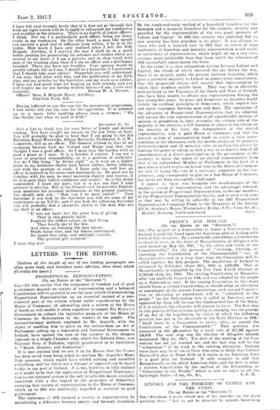LETTERS TO THE EDITOR.
(Letters of the length of one of our leading paragraphs are often more read, and therefore more effective, than those which fill treble the space.]
PROPORTIONAL REPRESENTATION.
[To THE EDITOR or THE " SPECTITOR."3 who realize that the enjoyment of freedom and of good government depends on -variety of representation and a balanced Constitution will be grateful to you for your article (1) pronouncing Proportional Representation as an essential instead of a non- essential part of the reform scheme under consideration by the House of 'Commons; (2) advocating such a reform of the House of Lords as will enable it when expedient to compel His Majesty's Government to submit the legislative proposals of the House of Commons Jay Referendum to the verdict of the people. The unconstitutional methods employed by Mr. Asquith, with the object of enabling him to place on the statute-book an Act of Parliament setting up a Separatist and National Government in Ireland, have opened the eyes of the country to the dangers inherent in a Single Chamber rule, which Sir Edward Grey, DDT/ Viscount Grey of Fallodon, rightly pronounced to be equivalent to "Death, disaster, and damnation."
It is now realized that we owe it to the Kaiser that the Crown has been savedfrom being asked to sanction Mr. Asquith's Home Rule measure, which would have settled nothing and unsettled everything, and for which not a whisper of approval can be heard to-day in any part of Ireland. It is not, however, so fully realized as it ought to be that the application of Proportional Representa- tion to our electoral system is the only practicable means available consistent with a due regard to the principles of democracy ensuring that variety of representation in the House of Commons which up to 1885 was universally regarded as essential to good government.
The statesmen of 1832 ensured a variety of representation by maintaining a difference between county and borough franchise. By the rough-and-ready method of a household franchise for the boroughs and a property franchise for the counties, security was provided for the representation of the two great interests of Labour and Capital. In 1885 this security was abolished, but no new security has been provided in its place! It was obvious to those who took a forward view in 1885 that in course of time uniformity of franchise and majority representation would result in uniformity of representation, which might set up a new class tyranny more intolerable than that from which the reformers of 1832 successfully emancipated the State.
In the event of a class antagonism arising between Labour and Capital, the clouds of which obscured the sky before the war, there is no security under the present uniform franchise, which gives a potential majority to Labour in almost every constituency, that the propertied classes will receive that representation to which their numbers entitle them. They may be as effectively disfranchised as the Unionists of the South and West of Ireland, who have been unable to obtain any representation during the last twenty-five years. So gross and dangerous an injustice would violate the cardinal principles of democracy, which require fair and equal treatment between man and man. The contention of the advocates of Proportional Representation that its adoption will ensure the true representation of all considerable sections of opinion in proportion to their strength; the certain rule of the majority of the electors; a full freedom of choice to the elector in the exercise of his vote; the independence of the elected representative.; and a good House of Commons; and that the present system of representation tends to create a false repre- sentation of the electorate, with the double chance of (1) minority disfranchisement and (2) minority rule; to enslave the elector by limiting his power of voting in such a way as to deprive him of all consciousness of a direct participation in the government of the country; to lower the status of an elected representative from that of an independent Member of Parliament to the level of a man who is afraid to give an holiest vote in the House of Commons for fear of losing the vote of a necessary supporter in his con- stituency, and consequently to give us a bad House of Commons, has never yet been successfully challenged.
I appeal to those who recognize the disadvantages of the majority system of representation, and the advantages inherent in the system of Proportional Representation, to become members of the Proportional Representation Society, and to send such sums as they may be willing to subscribe to the 1917 Proportional Representation Campaign Fund, to the Treasurer of the Society, 179 St. Stephen's House, Westminster Bridge, S.W.-1 am, Sir, &e.,
Howich, Lesbury, Northumberland. Ciar.r.


























 Previous page
Previous page